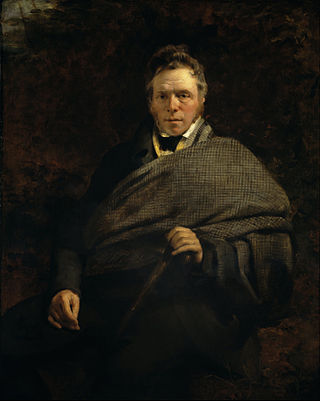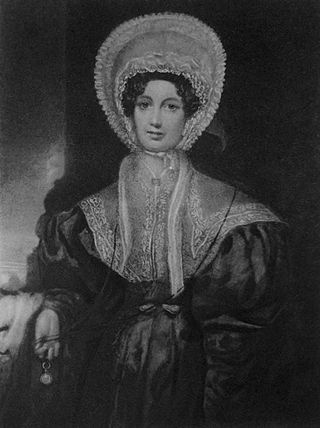Related Research Articles

William Blackwood was a Scottish publisher who founded the firm of William Blackwood and Sons.

James Hogg was a Scottish poet, novelist and essayist who wrote in both Scots and English. As a young man he worked as a shepherd and farmhand, and was largely self-educated through reading. He was a friend of many of the great writers of his day, including Sir Walter Scott, of whom he later wrote an unauthorised biography. He became widely known as the "Ettrick Shepherd", a nickname under which some of his works were published, and the character name he was given in the widely read series Noctes Ambrosianae, published in Blackwood's Magazine. He is best known today for his novel The Private Memoirs and Confessions of a Justified Sinner. His other works include the long poem The Queen's Wake (1813), his collection of songs Jacobite Relics (1819), and his two novels The Three Perils of Man (1822), and The Three Perils of Woman (1823).

Francis Jeffrey, Lord Jeffrey was a Scottish judge and literary critic.

John Galt was a Scottish novelist, entrepreneur, and political and social commentator. Galt has been called the first political novelist in the English language, due to being the first novelist to deal with issues of the Industrial Revolution.
George Robert Gleig was a Scottish soldier, military writer, and priest.

Susan Edmonstone Ferrier was a Scottish novelist. Her novels, giving vivid accounts of Scottish life and presenting sharp views on women's education, remained popular throughout the 19th century.

Alexander Seton, 1st Earl of Dunfermline (1555–1622) was a Scottish lawyer, judge and politician. He served as Lord President of the Court of Session from 1598 to 1604, Lord Chancellor of Scotland from 1604 to 1622 and as a Lord High Commissioner to the Parliament of Scotland.

The Private Memoirs and Confessions of a Justified Sinner: Written by Himself: With a detail of curious traditionary facts and other evidence by the editor is a novel by the Scottish author James Hogg, published anonymously in 1824.

Sir James Donaldson was a Scottish printer and newspaper publisher. He bequeathed a large part of his estate to the founding of Donaldson's Hospital.

Hugh Murray FRSE FRGS (1779–1846) was a Scottish geographer and author. He is often referred to as Hew Murray.

William Blackwood and Sons was a Scottish publishing house and printer founded by William Blackwood in 1804. It played a key role in literary history, publishing many important authors, for example John Buchan, George Tomkyns Chesney, Joseph Conrad, George Eliot, E. M. Forster, John Galt, John Neal, Thomas De Quincey, Charles Reade, Margaret Oliphant, John Hanning Speke and Anthony Trollope, both in books and in the monthly Blackwood’s Magazine.
The Queen's Wake is a narrative poem by James Hogg, first published in 1813. It consists of an Introduction, three Nights, and a Conclusion, totalling over five thousand lines, and there are also authorial notes. The poem presents the contributions, in various metres, of a series of Scottish bards to a competition organised by Mary, Queen of Scots on her arrival in Scotland from France in 1561.
The Three Perils of Man; or, War, Women, and Witchcraft. A Border Romance (1822) is a novel by James Hogg set in the Scottish Borders during the reign of Robert II, King of Scots (1371–90).
Lock the Door, Lariston is a border ballad by the Scottish poet James Hogg, the "Ettrick Shepherd", first published in 1811. It describes a sixteenth-century armed raid by English border reivers across the Anglo-Scottish border, met and defeated by Scottish borderers led by Jock Elliott of Lariston. Written in a traditional form, it was set to music by the 1850s, and is now a commonly performed Scottish folk song.
Mador of the Moor is a narrative poem by James Hogg, first published in 1816. Consisting of an Introduction, five cantos, and a Conclusion, it runs to more than two thousand lines, mostly in the Spenserian stanza. Set in late medieval Scotland, it tells of the seduction of a young maiden by a charismatic minstrel and her journey to Stirling in search of him, leading to the revelation that he is the king and finally to their marriage and the christening of their son.
Songs, By the Ettrick Shepherd is a collection of 113 songs by James Hogg published in 1831. All except one of the songs had previously appeared in print, mostly either in Hogg's earlier publications or in a range of periodicals.
Altrive Tales (1832) by James Hogg is the only volume to have been published of a projected twelve-volume set with that title bringing together his collected prose fiction. It consists of an updated autobiographical memoir, a new novella, and two reprinted short stories.
Tales of the Wars of Montrose is a set of six fictional narratives by James Hogg published in 1835. Each of them centres on the fortunes of an individual during the civil conflict of the 1640s in Scotland.
The Shepherd's Calendar (1829) is a collection by James Hogg of 21 articles, most of which had appeared in Blackwood's Edinburgh Magazine since 1819. They are set in, or deal with aspects of, the Scottish Borders, in particular Hogg's native Ettrick Forest.
A Series of Lay Sermons is a set of eleven moral and religious discourses by James Hogg published in 1834.
References
- ↑ James Hogg, A Queer Book, ed. P. D. Garside (Edinburgh, 1995), xiii.
- ↑ Ibid., xiii‒xvi; The Collected Letters of James Hogg: Volume 2 1820‒1831, ed. Gillian Hughes (Edinburgh, 2006), 433: Hogg to William Blackwood, 15 March 1831.
- ↑ Garside, op. cit., xi, xxi.
- ↑ James Hogg, Mador of the Moor, ed. James E. Barcus (Edinburgh, 2005), 23–27, 87–95.
- ↑ Ibid., xii, xxvi.